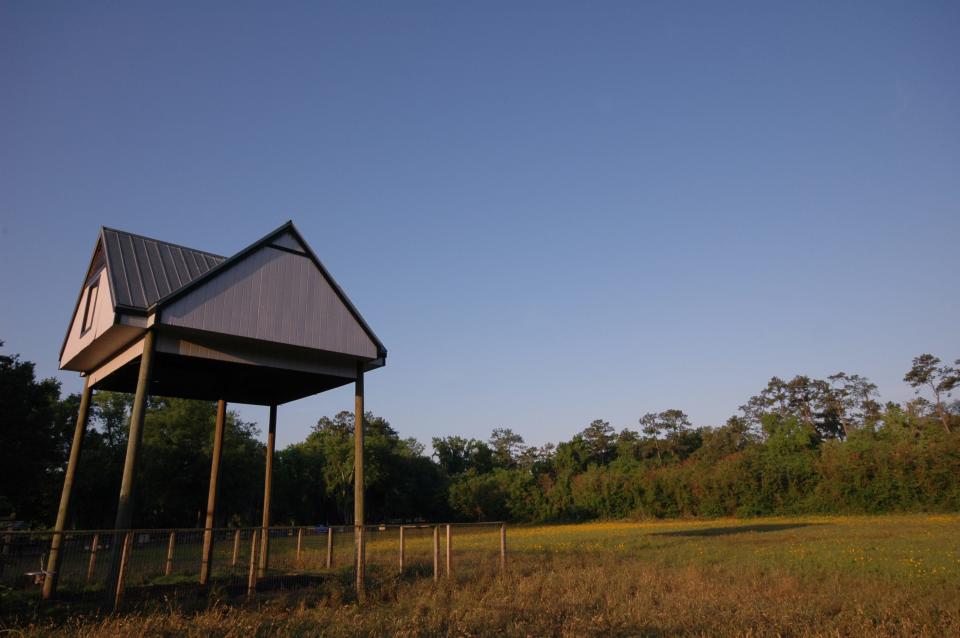Jeremy Rhoden: Let’s talk bats!
We are a little more than a week away from Halloween, so let’s talk about bats! Despite the many horrors we hear about bats in books and movies, they are actually quite beneficial! Though I can’t tell you whether they truly turn into vampires or vice versa, I can tell you that they save us from many mosquito bites and keep our crops from being totally devastated.
Florida is home to 13 bat species that live here year-round. All are considered nocturnal and have very high metabolisms, which means they must consume large amounts of insects to fulfill their energy demands. Some bat species live alone while others live in large colonies. The largest known Florida colony that exists today lives in the man-made bat houses that sit in front of Lake Alice at the University of Florida. It contains more than 450,000 Brazilian free-tailed bats that consume close to 2.5 billion insects each night (more than 2,500 pounds).

Another bat species known for eating more mosquitos than any other bat species in the entire nation is the southeastern bat (Myotis austroriparius). In general, bats love eating three main orders of insects: Coleoptera (beetles), Diptera (flies) and Lepidoptera (moths). Though mosquitos fall within the Diptera family, they aren’t normally favored to most bat species — but the southeastern bat has become dependent on mosquitos, particularly on colder nights when other insect species are not so available. The southeastern bat is one that lives with a large colony of other bats, and so collectively they can certainly reduce the mosquito population.
In other countries and in the western parts of the U.S., bats are major pollinators for many fruit trees and aid with seed dispersal. They are the primary predator for night-flying insects and therefore contribute greatly to our ecosystem. In addition, bat guano is another added benefit as it is extremely rich in nutrients and makes a great natural, organic 10-3-1 fertilizer for the garden.
If you are interested in attracting bats, consider erecting a bat house on your property. Small bat houses are typically simple to build, but it’s important to ensure you use the right materials so the bats can easily grip the slats to hold in place. Instructions for building a bat house can be found at edis.ifas.ufl.edu/publication/UW290 In addition, there are many premade bat houses available for purchase online and at many stores, but be wary of poor designs.
For more information on bats in Florida, visit edis.ifas.ufl.edu/publication/UW289.
October to-do list
Annuals: Cooler weather is already starting! Consider planting dianthus, pansy and petunias in the garden.
Bulbs: If you are wanting tons of beautiful blooms in the spring, now is the time to plant bulb plants, such as rain lily and agapanthus!
Herbs: Many herbs can be planted by seeds or seedlings at this time, including basil, garlic, chives, cilantro and many others! See herbs information at edis.ifas.ufl.edu/entity/topic/herbs.
Vegetables: Now is a great time to start leafy greens! This includes Brussels sprouts, broccoli, collards, cabbage, cauliflower, kale, lettuce and much more! Strawberries also will do well being transplanted in the garden at this time, but be prepared to protect them from insect pests and disease. For more on strawberries, visit gardeningsolutions.ifas.ufl.edu/plants/edibles/fruits/strawberries.html.
Upcoming programs at UF/IFAS Extension Marion County Office: Ongoing through Nov. 1: Fall Seed Sale. Just in time for your fall gardens, the Master Gardener Volunteers are pleased to present seeds for this upcoming season. Now also is an excellent time to scatter/plant native flowers and other cool-loving varieties, so don’t forget your pollinator-attractors. These seeds have been cleaned, prepared and packaged by a dedicated team and are all suitable to our climate. An advantage to purchasing from our program is the savings. They are packaged in small quantities to avoid waste, and the price is right at $1 per package or six for $5. To place your order and arrange for pick-up, call the Marion County Extension Office at 671-8400. Payment is by cash or check payable to University of Florida.
For more information, or to register for programs, call the UF/IFAS Marion County Extension Office at 671-8400.
— Jeremy Rhoden is the Urban and Residential Horticulture Extension Agent and Master Gardener Volunteer Coordinator at the UF/IFAS Extension Marion County. For more information, contact the office at 671-8400. The Extension Service is located at 2232 NE Jacksonville Road, Ocala, FL 34470.
This article originally appeared on The Gainesville Sun: Jeremy Rhoden: Let’s talk bats!

